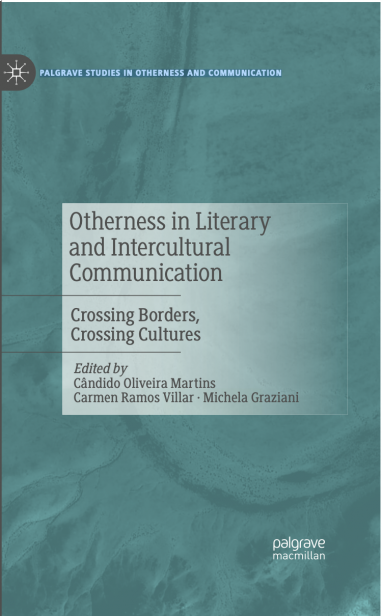The thematic volume Otherness in Literary and Intercultural Communication: Crossing Borders, Crossing Cultures (XVII, 328 pages), edited by researchers Cândido Oliveira Martins (Portuguese Catholic University - FFCS / CEFH, Carmen Ramos Villar (University of Sheffield - England) and Michela Graziani (University of Florence, Italy), was published by the international publishing house Palgrave / Springer.
This important volume is part of a 10-book series - Palgrave Studies in Otherness and Communication - coordinated by researchers Luísa Magalhães (Portuguese Catholic University - FFCS / CEFH and Enrique Castello Mayo (University of Santiago de Compostela). This is a relevant publication in terms of the thematic lines that guide the scientific production of the Centre for Philosophical and Humanistic Studies (CEFH).
Over the course of 20 chapters, this book investigates the different ways in which literature is a unique way of representing and thinking about contemporary society, dominated by intercultural dialogues, prejudices and tensions. Belonging to various European, American and African universities, the researchers behind the essays are: Guilherme d'Oliveira Martins (Portugal), Carlos Nogueira (Spain), André Corrêa de Sá (USA), Luís Cunha (Portugal), Filipe Martins (Portugal), Daniel Tavares (Portugal), Nazir Ahmed Can (Spain), Ada Milani (Italy), Pedro Schacht Pereira (USA), Sanae Elmoudden (USA), Ivana Ercegovac & Mirjana Tankosic (United Arab Emirates / Serbia), Anima McBrown & Lorenzo Dalvit (South Africa), Helena Buescu (Portugal), Valentina Pedone & Federico Picerni (Italy), Mariagrazia Russo (Italy), Hatice Bay (Turkey), Yang Nan & Lola Geraldes Xavier (Macau), Magdalena Bąk (Poland) and Mariah Wade (USA).
Analysing Lusophone literature and literatures from around the world from the perspective of intercultural communication, this book looks at post-colonial literature, intercultural negotiations and how multicultural debates are reflected in literary production. The topics covered include mobility and its effects, whether for professional, business, leisure, travelling or study reasons; contact between countries, even within the borders of one's own country; migration or exile, whether by choice or by force. As a whole, the volume offers a comparative study of the representations of intercultural communication through literature. The volume conceptualises literature broadly, including both traditional prose fiction and non-fiction, as well as more recent genres, including social media posts.
In summary, at an international level, this volume represents a relevant contribution to some current issues: it examines the ethics and politics of the notions of difference and otherness in literary contexts; it explores various narratives of the first encounters with the colonisers and the immediate aftermath of these encounters; it shows the possibility of thinking about the nation or the country from peripheral/regional and multicultural/cosmopolitan points of view. Relevant keywords include: alterity, identity, interculturality, multiculturality, border, migration, postcolonial, Lusophone studies, contemporary literature.





